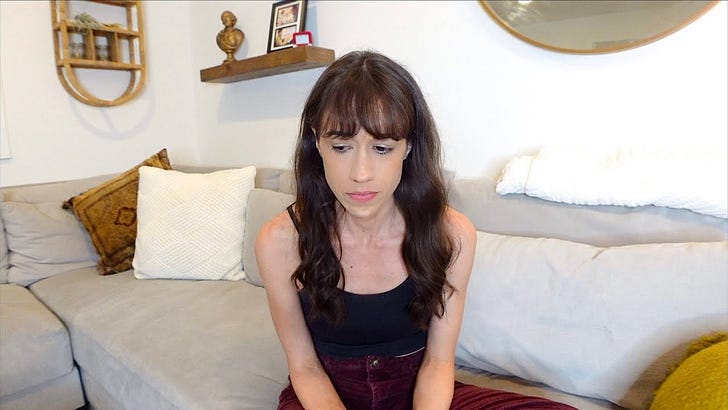Colleen Ballinger’s apology song was the last gasp of old YouTube
A cautionary tale for overstaying your internet welcome
Embedded is your essential guide to what’s good on the internet, written by Kate Lindsay and edited by Nick Catucci.
My only personal connection to this story is that for a full year as a teen I thought Miranda Sings was a real person. —Kate
On June 28, YouTuber Colleen Ballinger dropped what will likely go down in history as the most ill-advised response to an internet crisis of all time. At least previous hall-of-famers, like Dramageddon and Logan Paul, came with receipts or a sense of (scripted) remorse. Ballinger’s 10-minute song not only trivialized the serious allegations against her, but was snarky and combative without once adequately addressing any of the claims.
Ballinger, now 36, has been a prominent YouTube creator since 2008, when she created a viral character called Miranda Sings. She went on to amass millions of followers for both herself and Miranda, and a dedicated fandom of then-minors—some of whom have since accused her of inappropriate behavior. These accusations include sending one fan her underwear, asking about their virginity status in group chats, and manipulating them into defending her online.
Creator Adam McIntyre made initial accusations against Ballinger in 2020, but it wasn’t until June 2023 that other fans came forward. McIntyre has since stated plainly that he feels he was groomed by the creator.
That we’re even having a conversation about this dynamic is indicative of how we’ve evolved to understand the nuances of the creator-follower relationship, which perhaps helps to emphasize the overwhelming feeling about Ballinger’s sing-songy response: Other than being insensitive, it’s painfully, painfully dated.
put it perfectly in a recent Garbage Day:“I suppose younger internet users might not remember that there was a stretch from 2013-2016 where something like this would happen on YouTube almost every day. Everything about Ballinger’s video, from the ukulele, to her bangs, to the dismissive faux-relatable gee-whiz tone, to the title, ‘hi.,’ complete with punctuation and no capitalization, is so painfully twee 2010s millennial cringe that watching it for more than few seconds felt like staring directly at the sun.”
Ballinger’s story, as far as 2008 YouTube creators go, is typical. She stumbled upon a viral persona, but instead of using it as a springboard, has kept a white-knuckle grip on it for 15 years. The character existed solely on YouTube until Ballinger landed a short-lived Netflix series in 2016 (speaking of, a former writers’ assistant on the show recently came forward about her own experiences with the creator). When this renewed controversy broke, Ballinger was in the middle of yet another Miranda-based comedy tour.
But the content creation industry is too broad and established now for a single viral schtick to sustain someone—something current up-and-coming creators know.
“The main theme of VidCon 2023 was learning how to hack into real, sustainable success, now that the days of out-of-nowhere paydays and effortless virality are behind us,” Amanda Perellli wrote in a VidCon dispatch for Insider. “Rather than crowding around the buzziest influencer, attendees were networking and trading tips. Many of the panels this year were centered around industry lessons, like tools for creators and tips for discovering new career paths.”
It’s remarkable to me that Colleen has had to apologize for racism, fatphobia, and alleged animal abuse but has made very few actual changes to how she shows up online, making the same jokes about sexual assault and putting children in uncomfortable positions on stage. The only meaningful shift was when she became a parent and promptly began posting videos of her children in a way that has also been criticized. Her twee response to legitimate allegations is further proof that she’s operating with an outdated internet playbook and refuses to change, but the reception to her video—which as of June 19th had over 469,000 dislikes—could finally force her hand.
While three years ago she could have bowed out of this era gracefully with an acknowledgment that times have changed, she’s dug in her heels. I’m not sure what credibility she has to parlay Miranda into a new chapter of her career, since she’s shown she’s actually lost control of the one skill she could potentially market. Instead, she may exist only as a cautionary tale for current creators, especially any whose popularity is tied to a cultural moment that’s shrinking further and further away in the rearview. The car won’t stop. It can only crash.





